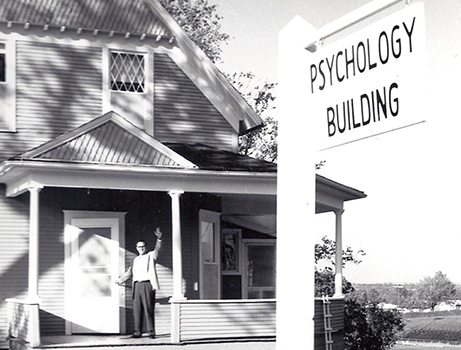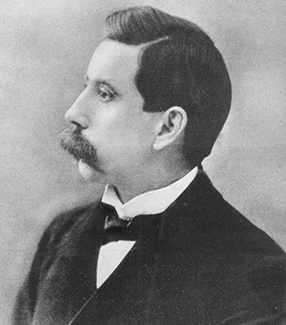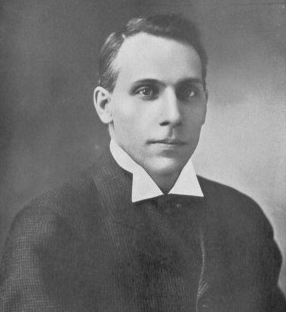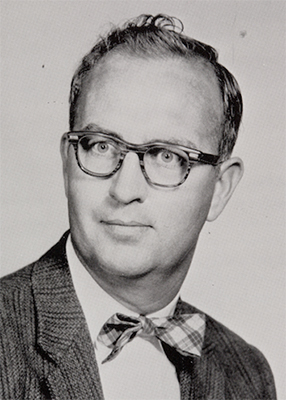Department of Psychology
WIU Home > CAS > Psychology
History of
WIU's Psychology Department
The following narrative is based on the department colloquium presented by Dr. Jeff Laurent on April 20, 2018, titled,
“Psychology at Western Before There Was PSYCHOLOGY at Western.”


President John Henninger
Psychology Was Present at Western from the Beginning
A psychology course has been offered at Western since it opened its doors in 1902. In the first course catalog from the first year of Western Illinois State Normal School (1902-1903), President John Henninger is listed as the head of the Department of Psychology and Pedagogy. The first course listed in the catalog under the Department of Psychology and Pedagogy is Psychology, a three-term course.
According to Victor Hicken (The Purple and the Gold: The Story of Western Illinois University, 1970), “Henninger was a prototype for his faculty. All of them being more experienced in administration and teacher training than in subject matter.” In other words, there is no record that Henninger had ever taken any psychology courses.
Psychology in the service of education is a consistent theme with respect to psychology at Western before the Department of Psychology was founded in 1961. Western Illinois State Normal School, like all the normal schools in Illinois, was a college for training teachers. Each of these normal schools had training schools where teachers-in-training could develop their skills and be observed. These training schools eventually became known as laboratory schools. At Western, the first floor of the Main Building (now Sherman Hall) contained the training/laboratory school. The second and third floors housed the normal school (i.e., the university).

Frederick G. Bonser
Who Was the First Psychologist at Western?
Frederick G. Bonser
Although President Henninger taught the psychology course, he wasn’t trained as a psychologist. The first faculty member at Western who was trained as a psychologist was Frederick Bonser who joined Western in 1906.
Bonser earned his bachelor's and master’s degrees in psychology from the University of Illinois. He then was an Instructor in Psychology and Director of Training School, at State Normal Training School, Cheney, Washington (now Eastern Washington University).
Bonser was pursuing his doctorate at Columbia University where he worked with Edward L. Thorndike. E. L. Thorndike is considered the father of educational psychology, which best describes Bonser’s interests in psychology. Bonser left Columbia to accept the position at Western in the fall of 1906; he had not completed his dissertation.
Bonser taught a course titled Elementary Psychology. His major responsibility, however, was as the Supervisor (i.e., principal) of the training/laboratory school.
Bonser facilitated research collaborations with Columbia and the University of Illinois. For example, during his second year at WISNS, Bonser reported ongoing research in experimental psychology: “In cooperation with the Department of Psychology of the University of Illinois, a study has been under development since February on ‘Memory Processes in Children and Adults.’ This study will soon be completed and when its full results are known it is probable that they will be found of some definite value in education.” [Principal’s Report Register 1907-08]
The 1908 edition of the Sequel (i.e., Western’s yearbook) was dedicated to Bonser. The two-page dedication does a nice job of providing an overview of his life and illustrating the students’ esteem for him. An excerpt of the dedication follows:
He was born in Avon, IL (Fulton County). He attended rural schools and after graduating from Avon High School he became a country school teacher in one-room schools. He attended the University of Illinois. At the time he received his Master’s degree, he was pronounced the best psychologist the university had so far produced. After three years of service as professor of psychology and education, in the Cheney, Washington, State Normal School, he was again given a fellowship in education, this time in Teachers College, Columbia University, where he has done all the class work, and past all the examinations preliminary to the degree of Doctor of Philosophy, which he will receive upon the completion of his thesis, necessarily delayed by the pressure of work here. In the summer of 1906 he had charge of the work in the Teachers College, coming to Macomb in the autumn of that year, in the capacity of Head Instructor in Education, and Director of the Elementary School.
Bonser resigned his position at Western in 1910 to accept the post of Principal of the Speyer School (i.e., the laboratory school) at Teachers College, Columbia University. Upon his return to Columbia, he completed his dissertation (with Thorndike as his chair) and was awarded his Ph.D. in 1910.
Bonser is recognized as an early pioneer in manual training, better known as industrial arts, the genesis of today’s technology education.
Psychology After Bonser
The foundation course in psychology continued to be offered, and other psychology or psychology-type courses were developed after Bonser left WISNS. However, the faculty members who taught these courses were not trained as psychologists.
It wasn’t until 1935, when Leon Pennington arrived at Western Illinois State Teachers College, that Western hired its second faculty member who was trained as a psychologist. Pennington earned his bachelor's and master’s degrees from the University of Michigan, and earned his Ph.D. in Psychology from Brown University. While a Master’s student at Michigan, he was an Instructor of Psychology. At Brown, he was a Laboratory Instructor in Experimental Psychology.
A handful of others trained as psychologists were hired at Western as either faculty members (e.g., Clifford H. Pearce) or administrators who also taught some psychology courses (e.g., Genevieve Chase, D. Louise Sharp, Arthur Ter Keurst). Many stayed only a short time at Western before moving to different universities.
Before, during, and after Bonser, the focus of the psychology course(s) was largely on the application of psychology to education. This was consistent with Western’s mission to train teachers.
In 1929, C. R. Garvey published an article in Psychological Bulletin where he attempted to trace the history of psychology laboratories at colleges and universities throughout the United States. He sent letters to universities/colleges asking for information about the founding of their psychology laboratory, the founder, the support, the first publication from the lab, etc.
The first names on the list published by Garvey are familiar – Harvard (William James/Hugo Münsterberg), Johns Hopkins (G. Stanley Hall), and the University of Pennsylvania (James McKeen Cattell). If you read through the list of schools, you eventually arrive at #109 – Western Teachers College, Macomb, Illinois. According to Garvey’s article, Western had no laboratory, because there was no space. In 1929, the Western campus consisted of the Main Building (now Sherman Hall), the School of Arts (opened in 1918 to address overcrowding in the Main Building; now Garwood Hall), and Monroe Hall (a residence for women opened in 1913; later named Grote Hall [1947], it was torn down in 1991).
Perhaps the true reason Western had no psychology laboratory was because at the time of Garvey's survey we had no faculty members trained as psychologists. In other words, it is likely that no one was pushing for a psychology laboratory. The experimental psychology that called for laboratory space was different from the applied educational psychology taught at Western.

James Joyce
Enter James Joyce and Today’s Department of Psychology
From the day it opened its doors in 1902 until 1961, psychology served education at Western. The application of psychology to support learning and mental hygiene in the education of elementary students was the focus. Although important, this type of psychology was different from the experimental psychology of major research universities like Harvard, Cornell, University of Pennsylvania, and Johns Hopkins.
Western Illinois University’s commitment to a Department of Psychology similar to those at the University of Illinois, the University of Wisconsin, and other major institutions came in 1960 when James Joyce was hired. Joyce was given a specific task – develop a Department of Psychology that would accept students beginning in the Fall Term of 1961.
Joyce earned his B.A. from Indiana University in 1950. His M.S. and Ph.D. were earned from Ohio State University in 1952 and 1955, respectively. His master’s thesis on the comparison of objective measures of expectancy was conducted under the supervision of Julian Rotter, who is considered the father of social learning theory. His dissertation was on the role of language acquisition and extinction.
Joyce completed his doctoral internship with the Veterans Administration. His clinical training included time spent at a neuropsychiatric hospital in Chillicothe, OH, and an outpatient mental hygiene clinic in Columbus, OH. He worked as a psychologist at the State School for the Mentally Retarded, Columbus, OH.
Joyce’s academic career began in the Psychology Department at Coe College where he worked his way from assistant to associate professor during 1955-60. He accepted a position as Acting Chairman of the Department of Psychology, at Western Illinois University in 1960. He was the acting chair because the department didn’t exist upon his arrival.
The Psychology Department that we know today first accepted students for the Fall 1961 term. The size of the Department has ebbed and flowed with the enrollment at the University. Historically, Psychology is ranked among the top 5 majors at the University.
Currently, the Department has 21 faculty members, approximately 350 undergraduate majors, 375 minors, and 50 graduate students in Master’s programs (General Experimental Psychology and Clinical/Community Mental Health) and a Specialist program (School Psychology). The Department includes a Psychology undergraduate major with two Options (Psychology, Forensic Psychology), as well as minors in Psychology, Forensic Psychology, Aging Studies, Neuroscience, and Mental Health.

Connect with WIU: